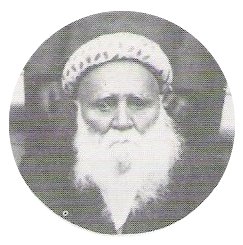
Hájí Amín
Encyclopedia

Bahá'u'lláh
Bahá'u'lláh , born ' , was the founder of the Bahá'í Faith. He claimed to be the prophetic fulfilment of Bábism, a 19th-century outgrowth of Shí‘ism, but in a broader sense claimed to be a messenger from God referring to the fulfilment of the eschatological expectations of Islam, Christianity, and...
, the founder of the Bahá'í Faith
Bahá'í Faith
The Bahá'í Faith is a monotheistic religion founded by Bahá'u'lláh in 19th-century Persia, emphasizing the spiritual unity of all humankind. There are an estimated five to six million Bahá'ís around the world in more than 200 countries and territories....
, a global religion of Persian origin. Amín served as the trustee of Huqúqu'lláh
Huqúqu'lláh
Huqúqu'lláh , sometimes called the Law of Huqúq is a socio-economic and spiritual law of the Kitáb-i-Aqdas, a charter document of the Bahá'í Faith, written by Bahá'u'lláh...
, was posthumously appointed a Hand of the Cause of God by Shoghi Effendi
Shoghi Effendi
Shoghí Effendí Rabbání , better known as Shoghi Effendi, was the Guardian and appointed head of the Bahá'í Faith from 1921 until his death in 1957...
, and identified as one of the nineteen Apostles of Bahá'u'lláh
Apostles of Bahá'u'lláh
The Apostles of Bahá'u'lláh were nineteen eminent early followers of Bahá'u'lláh, the founder of the Bahá'í Faith. The apostles were designated as such by Shoghi Effendi, the Guardian of the Bahá'í Faith, and the list was included in The Bahá'í World, Vol...
.
Background

Yazd
Yazd is the capital of Yazd Province in Iran, and a centre of Zoroastrian culture. The city is located some 175 miles southeast of Isfahan. At the 2006 census, the population was 423,006, in 114,716 families....
, Iran
Iran
Iran , officially the Islamic Republic of Iran , is a country in Southern and Western Asia. The name "Iran" has been in use natively since the Sassanian era and came into use internationally in 1935, before which the country was known to the Western world as Persia...
. When news of the declaration of Bahá'u'lláh came, he accepted immediately and travelled throughout the Persian Empire teaching the new message.
He was a literate man, and earned his living by trading and writing for the illiterate as he travelled. He was known to collect letters that people wished to forward to Bahá'u'lláh, and also distributed tablets of Bahá'u'lláh where people received them.
He made his way to 'Akká
Acre, Israel
Acre , is a city in the Western Galilee region of northern Israel at the northern extremity of Haifa Bay. Acre is one of the oldest continuously inhabited sites in the country....
, and became the first Bahá'í from outside of the city to see Bahá'u'lláh, returning on several occasions. When Haji Shah-Muhammad Manshadi was killed in 1880, Amín became the trustee of the Huqúqu'lláh
Huqúqu'lláh
Huqúqu'lláh , sometimes called the Law of Huqúq is a socio-economic and spiritual law of the Kitáb-i-Aqdas, a charter document of the Bahá'í Faith, written by Bahá'u'lláh...
.
Hájí Amín, lived a long life and was Trustee of the Huqúqu'lláh
Huqúqu'lláh
Huqúqu'lláh , sometimes called the Law of Huqúq is a socio-economic and spiritual law of the Kitáb-i-Aqdas, a charter document of the Bahá'í Faith, written by Bahá'u'lláh...
[“Right of God”--a certain Bahá'í fund] during the ministries of Bahá'u'lláh and 'Abdu'l-Bahá and during part of the ministry of Shoghi Effendi. During his long and turbulent life he was a source of inspiration and loving guidance for all the believers. He often visited their homes and urged them to become detached from the things of the world and to follow the path of modesty in all aspects of life.
In 1891 he was imprisoned for three years in Tihran and Qazvin
Qazvin
Qazvin is the largest city and capital of the Province of Qazvin in Iran. At the 2006 census, its population was 349,821, in 96,420 families....
, and during the time of `Abdu'l-Bahá
`Abdu'l-Bahá
‘Abdu’l-Bahá , born ‘Abbás Effendí, was the eldest son of Bahá'u'lláh, the founder of the Bahá'í Faith. In 1892, `Abdu'l-Bahá was appointed in his father's will to be his successor and head of the Bahá'í Faith. `Abdu'l-Bahá was born in Tehran to an aristocratic family of the realm...
he continued his travels, visiting 'Akká and Haifa
Haifa
Haifa is the largest city in northern Israel, and the third-largest city in the country, with a population of over 268,000. Another 300,000 people live in towns directly adjacent to the city including the cities of the Krayot, as well as, Tirat Carmel, Daliyat al-Karmel and Nesher...
on many occasions. In old age he settled down in Tihran.
External links
- Biography, by Moojan Momen

